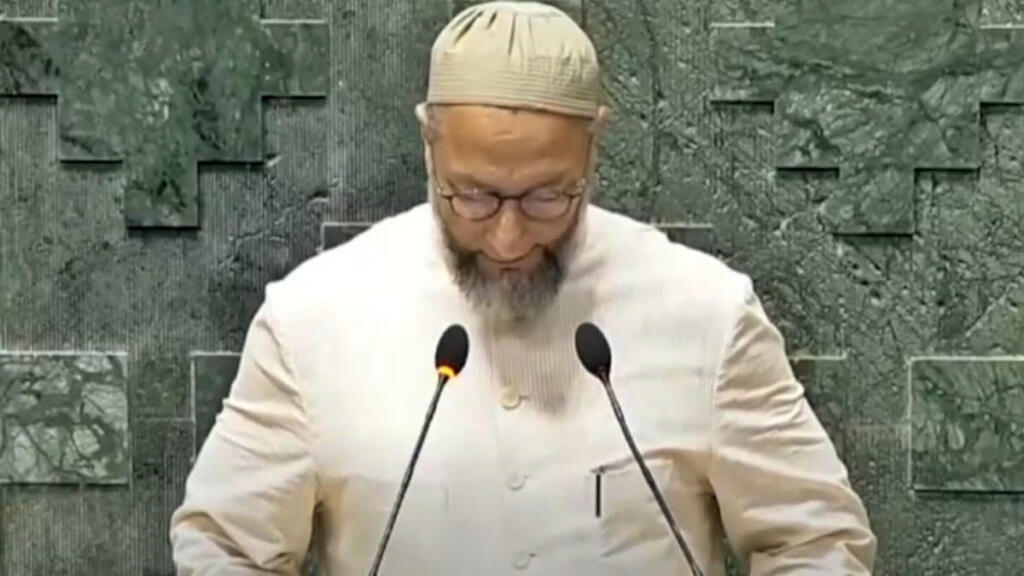The 18th Lok Sabha’s oath-taking ceremony became a hotbed of controversy when Asaduddin Owaisi, the outspoken leader of the All India Majlis-e-Ittehadul Muslimeen (AIMIM), made remarks that ignited a fierce debate. Owaisi, known for his bold statements and staunch advocacy for Muslim rights, found himself at the center of attention once again, highlighting the complex interplay of politics, religion, and international relations in India’s parliamentary system.
Owaisi’s Controversial Oath and Palestine Support
After reciting his oath in Urdu, Owaisi voiced support for Palestine, a conflict-ridden region in West Asia. This unexpected mention of a foreign entity during a solemn parliamentary procedure immediately raised eyebrows and led to vehement objections from the treasury benches. Despite the uproar, Owaisi remained steadfast in his position, citing historical precedents and emphasizing the plight of oppressed people.
The AIMIM leader defended his actions, stating, “How is it wrong? Tell me the provision of the Constitution?” Owaisi further justified his stance by referencing Mahatma Gandhi’s views on Palestine, attempting to lend historical legitimacy to his controversial statement.
Communal Undertones and Political Reactions
The incident quickly took on communal overtones, with various political figures weighing in on the matter. While Owaisi’s supporters viewed his actions as a brave stand for minority rights, his critics accused him of inappropriately mixing religion and politics. This exchange highlighted the ongoing tensions surrounding issues of secularism and religious expression in Indian politics.
Owaisi’s Influence on Muslim Voters
Owaisi’s actions can be seen as part of a broader political strategy to solidify his position as a key representative of Muslim interests in India. By consistently raising issues important to the Muslim community, Owaisi has managed to carve out a unique space in Indian politics. His approach, though controversial, has helped him maintain a strong presence and influence among Muslim voters.
Congress and Opposition Response
Interestingly, the Congress party, led by Rahul Gandhi, remained relatively quiet on the issue. This silence from the main opposition party added another layer to the complex political dynamics at play. The lack of a strong response from Congress raised questions about the party’s strategy in dealing with issues related to minority rights and international relations.
Other opposition parties, however, were quick to voice their opinions, further fueling the debate. Some accused Owaisi of seeking attention, while others defended his right to express solidarity with oppressed communities worldwide.
Legal and Procedural Questions Surrounding Owaisi’s Oath
The incident also raised important questions about parliamentary procedures and the potential consequences of Owaisi’s actions. Some members suggested that mentioning a foreign state during the oath-taking could lead to disqualification. Parliamentary Affairs Minister Kiren Rijiju stated that he had received complaints from some members about the mention of Palestine and would need to check the rules regarding such remarks.
The pro-tem Speaker, Bhartruhari Mahtab, intervened to clarify that only the oath or affirmation would be recorded, emphasizing the need to adhere to parliamentary norms during the swearing-in process.
Owaisi’s Impact on Indian Politics and Communal Discourse
Asaduddin Owaisi continues to be a polarizing figure in Indian politics. His outspoken nature and willingness to address sensitive issues keep him in the spotlight. While his supporters view him as a necessary voice for minority rights, critics accuse him of divisive politics and playing the communal card.
The Palestine Controversy: A Broader Context
Owaisi’s mention of Palestine during his oath-taking is not an isolated incident but part of a larger pattern of his advocacy for international Muslim causes. This approach resonates with a segment of Indian Muslims who feel a connection to global Islamic issues. However, it also raises questions about the appropriateness of bringing international conflicts into domestic political procedures.
Conclusion
As the 18th Lok Sabha begins its term, the incident serves as a stark reminder of the challenges and complexities inherent in India’s diverse and vibrant democracy. It underscores the need for ongoing dialogue and understanding among different communities and political factions to maintain the delicate balance of unity in diversity that defines the Indian nation.
ALSO READ: The Double Standards of Pakistan and Congress on Kashmir!
